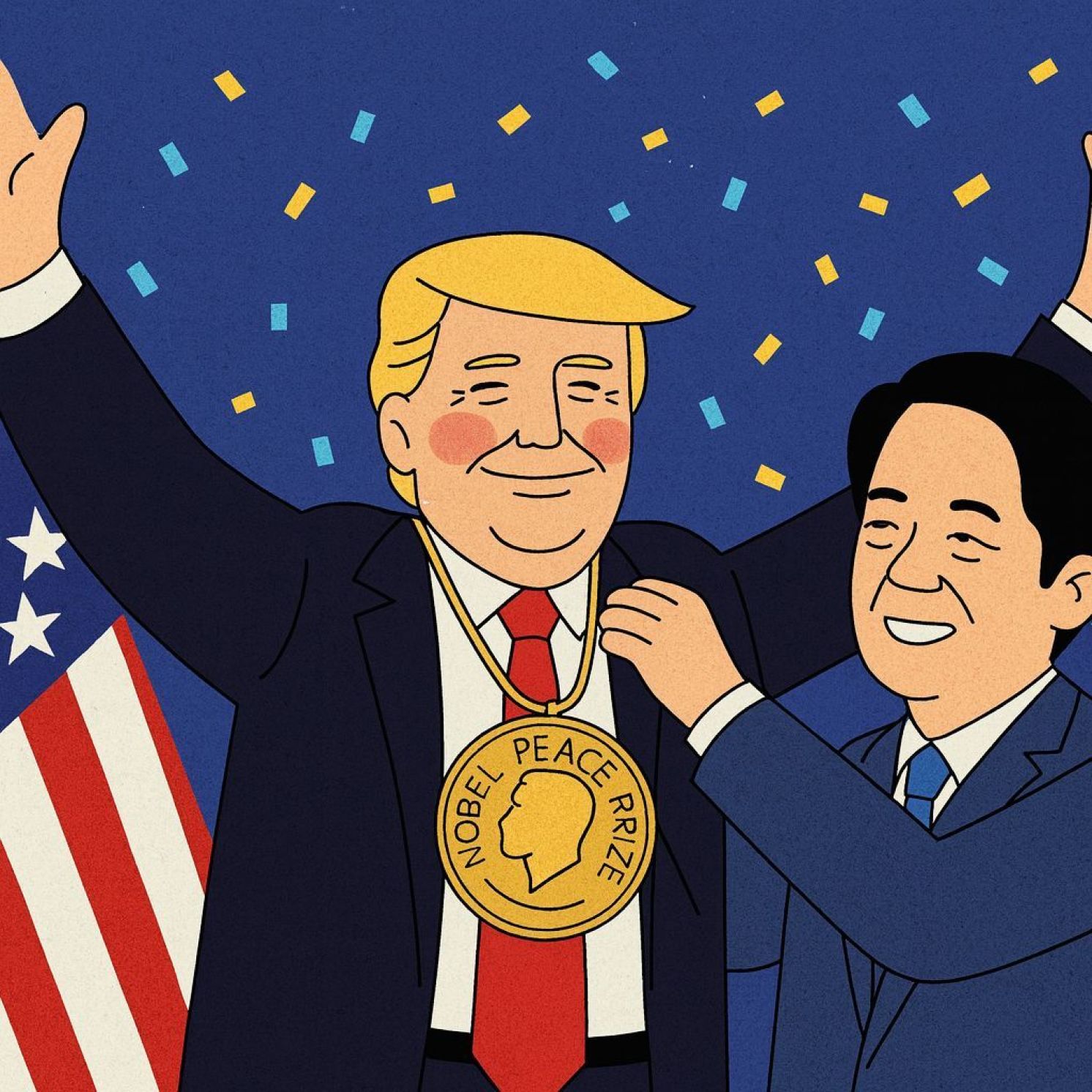
President Lai Flatters Trump, helping Him "De-Taiwanize" the issue
China Times Editorial, October 8, 2025
On the eve of National Day, President Lai Ching‑te gave an interview to an American conservative radio program, warning that if Taiwan were annexed, then it would directly harm U.S. interests. He added that if President Donald Trump of the United States could persuade Chinese President Xi Jinping to abandon the use of force against Taiwan, he would deserve the Nobel Peace Prize. A White House spokesperson later responded that “Trump deserves the prize,” prompting cheers from supporters of President Lai’s ruling party, who viewed it as a symbolic alignment between President Lai and Mr. Trump. Yet, the White House avoided any mention of Taiwan—suggesting that the praise was more about flattering Mr. Trump than endorsing President Lai’s remarks.
President Lai’s Nobel Prize comment echoes a similar statement he made earlier this year crediting late Japanese Prime Minister Shinzo Abe for Taiwan’s peace and stability. The underlying logic is the same: Taiwan’s security relies on the United States and Japan. While the ruling Democratic Progressive Party (DPP) often criticizes its opponents for “losing national dignity,” President Lai’s flattering of Mr. Trump and his gratitude toward Abe show a different form of diminished presidential stature. It also reflects what critics call a “de-Taiwanization” of foreign policy—a self-inflicted weakening of Taiwan’s diplomatic agency.
The concept of “de-Sinicization” was once mostly used by Taiwan’s pro-independence groups. But after the pandemic, it gained broader geopolitical meaning, as countries realized the risks of overreliance on China. This led to calls for economic “decoupling” or, more moderately, “de-risking.” Ironically, Trump’s emerging “2.0” foreign policy seems to be encountering setbacks in “de-Sinicization” while advancing a form of “de-Taiwanization.”
Mr. Trump initially believed that semiconductors, high tariffs, and restrictions on TikTok would be enough to pressure Beijing. But China responded with its own restrictions on rare earth exports, striking a vital nerve in the U.S. supply chain. Negotiations dragged on, and even Secretary of State Marco Rubio has acknowledged that the two countries have entered a “strategic stalemate.”
As for “de-Taiwanization,” its roots trace back to Mr. Trump’s earlier metaphor comparing China to “the table” and Taiwan to “the pen tip.” Mr. Trump has long viewed Taiwan with skepticism. Many pro-Taiwan moves during his first term were driven by his aides—most of whom are now gone. With his return to the political stage, his nationalist, transactional worldview has reasserted dominance. Mr. Trump has already demanded Taiwan raise its defense spending to 5 percent of gross domestic product (GDP), then to 10 percent, and his Secretary of Commerce Howard Lutnick has floated a “50-50 chip sharing” plan to shift Taiwan’s semiconductor supply chain to the United States—reducing Taiwan’s strategic value and treating it as a dispensable burden.
Whether Americans support Trump’s “de-Taiwanization” is their own matter. What is more concerning is the Lai administration’s willingness to play along—actively lowering Taiwan’s strategic value to Washington. From handing over Taiwan Semiconductor Manufacturing Company’s (TSMC) massive $100 billion investment as a “welcome gift” to accepting additional tariffs and proposing industrial park models in the United States, Taipei has consistently aligned itself with Mr. Trump’s “Make America Great Again” narrative—without realizing that Mr. Trump’s vision rests on “draining others to enrich America.”
Taiwan’s security ultimately depends on peaceful cross-strait dialogue, not on relying on the United States or Japan to counter mainland China. Ignoring Taiwan’s own power and public sentiment while gambling on foreign support is, critics argue, the clearest sign of “de-Taiwanization.” If this continues, then it could erode the wealth and security built up by generations of Taiwanese people—making the island what some analysts call “the most dangerous place on earth.”
While President Lai’s Nobel Prize comment grabbed headlines, the more significant message from the interview came when he said, “As long as there is equality and dignity, Taiwan is willing to engage in negotiations with China to achieve peaceful coexistence through exchanges and cooperation.” It was the first time President Lai publicly expressed willingness to negotiate with Beijing—a stance consistent with his remarks earlier this year, when he said cross-strait issues must be addressed through “talks, not war.”
From: https://www.chinatimes.com/opinion/20251008004091-262101?chdtv